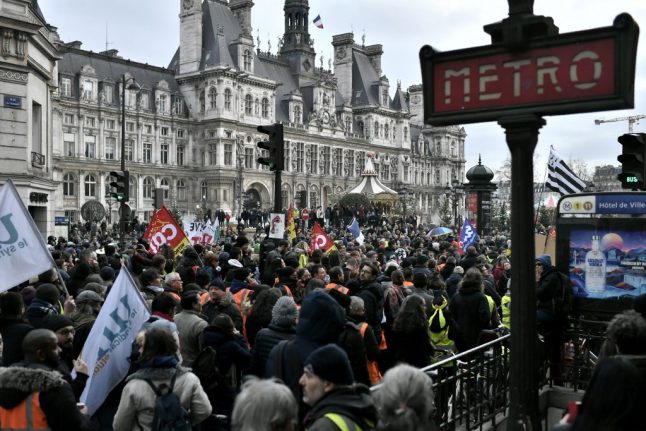With no end in sight for mass transportation strikes – now the longest of their kind since the 1980s – trains and city transport are again disrupted on Tuesday, December 31st.
Unions have declared unlimited strike action in protest at plans to reform the French pension system, which they say will leave people working for longer for a smaller pension pot.
With talks not due to start again until January 7th, more days of disruption seem likely.
Here's a look at what's happening on December 31st:
In Paris public transport services are again badly hit with a severely limited service running on the Metro.
The strike has also hit the New Year's Eve tradition off all-night transport – on previous years some Metro, tram and bus lines have run through the night to allow revellers to make their way home in the wee small hours.
This year, only buses and three of the city's eight tram lines will be running all night.
On the Metro lines 1 and 14 – which are automated – are running as normal during the day, and will continue running until late. The last departure from terminus is at 1.45am and the service will end at 2.15am.
Although in better news for suburb-dwelling party-goers, there will be RER service running all night, albeit a limited number and departing only from Gare du Nord, Gare de l'Est and Saint-Lazare.
READ ALSO New Year's Eve in Paris: What to do and how to get around
During the day services are similar to those seen on Monday with only two Metro lines closed completely.
[Mouvement Social]⚠️Le trafic pour le mardi 31 décembre restera très perturbé, avec une offre similaire au lundi 30 sur le #métro et #RER #RATP. Le détail des prévisions⬇️et sur https://t.co/OElUNYGYky pic.twitter.com/HNFsoOwOJ8
— RATP Group (@RATPgroup) December 30, 2019
Lines 1 and 14 are running as normal all day and lines 7bis and 13 are closed completely.
The other lines are offering a limited service.
Lines 2, 3, 4, 5, 7, 8, 9 and 10 are running only during the rush hours – 6.30am to 9.30am and 3.30pm to 7.30pm.
Line 11 is running only during the morning rush hour and lines 6 and 12 are running only during the evening rush hour, while line 3bis is running afternoon only.
On the trams things are nearly back to normal, with all services running all day – lines 2, 3b and 5 completely normal and lines 1, 3a, 6, 7 and 8 'quasi normal'.
On the RER there are still fewer services running than normal, with the lines not operating all day, and on the buses three quarters of the normal services are running.
In the bigger French cities such as Toulouse, Bordeaux, Lyon and Strasbourg – where city transport is not affected by the strike – buses and Metro services will be running all night.
Across France, a total of 100,000 police officers will be deployed to keep the peace on a night that has in the past seen outbreaks of trouble.
On the railways services are again disrupted, but not to the levels seen at the start of the strike on December 5th.
? CIRCULATION DES TRAINS le 31 décembre ?
? Retrouvez l’info en temps-réel la veille dès 17h sur l’#AssistantSNCF ? https://t.co/eiZMVDEquX pic.twitter.com/bR4fdj3o3l— SNCF (@SNCF) December 30, 2019
Overall half the normal services on the high speed TGV lines are running and one third of the normal budget Ouigo services. And if you do take the train you may have the carriage to yourself, as there have been reports of some trains running almost empty as people assume there is no service and make alternative arrangements.
Half of the local TER services are running – the highest level since the strike began – while a quarter of Transilien and a fifth of Intercité services are running.
In general in France, strikes get less disruptive as time goes on.
This is because French workers are not paid during the strikes, so after a couple of weeks many start feeling the strain financially and go back to work, which has allowed both SNCF and Paris transport operator RATP to offer gradually more services as the strike progresses.
READ ALSO French strikers say 'If we give in now, we will have lost everything'
On December 30th, just 32.5 percent of SNCF train drivers were striking, compared to 85 percent on the first day of the strikes.
Unions do not pay strike pay to their members, but do run cagnottes, or collections, for donations to be passed on the striking workers.
On December 26th, the CGT union announced that its collection had topped €1 million since the strikes began. The donations comes from members of the public, so as well as serving a practical function they can be a useful indicator of the level of public support for a strike.
There are no flight disruptions announced and the Eurotunnel is running as normal, although Eurostar services are limited until January 3rd.



 Please whitelist us to continue reading.
Please whitelist us to continue reading.
Question. Will RATP refund (us) annual Navigo holders for December?